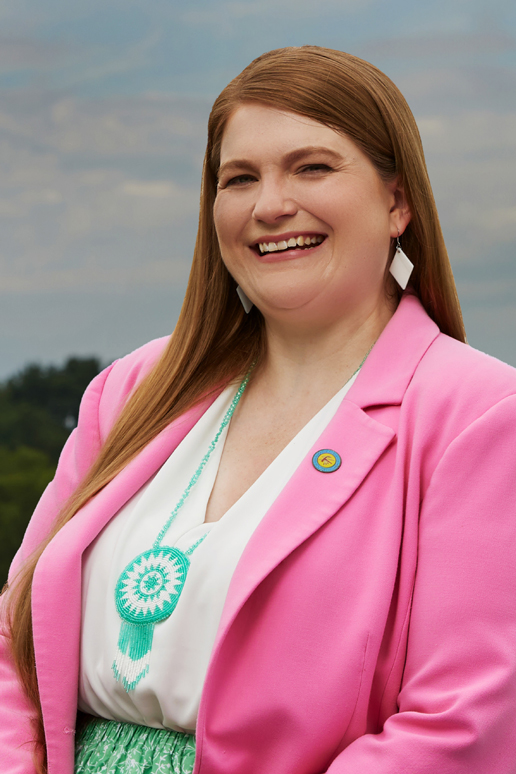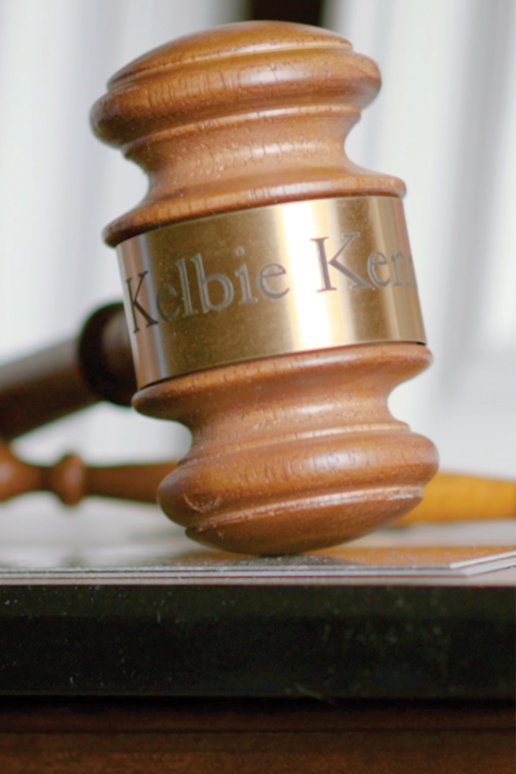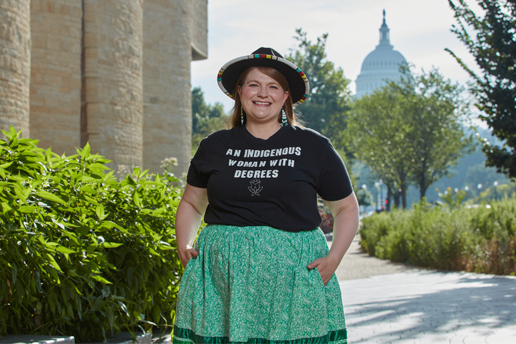Kelbie Kennedy, Advocate

Choctaw tribal member Kelbie Kennedy is a proud citizen of the Choctaw Nation of Oklahoma and serves as the first-ever National Tribal Affairs Advocate for the Federal Emergency Management Agency (FEMA). Born and raised in Buffalo Valley, Oklahoma, Kelbie grew up in a close-knit, rural community known for its farming and cattle-raising. Kelbie’s upbringing in Buffalo Valley, surrounded by family, shaped her strong sense of community and responsibility.
“Buffalo Valley has about 3,000 citizens living there, and about 2,800 of them are cattle,” Kelbie jokes.
Her early education took place in small local schools, but despite the small size of her schools, she was actively involved in various activities, including Future Farmers of America (FFA), speech and debate, and varsity sports. Her summers were spent working on her family’s farm, learning the value of hard work and community support. “Some of my best memories are from growing up on a farm, everybody helping out,” said Kelbie.

“Everybody had their role…but it was all going toward helping the family, being able to make sure that we could feed the cattle during the winter.”
Her involvement with her tribal community started early, participating in the Choctaw Nation’s Youth Advisory Board and attending cultural events. Influenced by her experiences and the encouragement of Chief Gary Batton, Kelbie pursued a career in law, focusing on federal Indian law and international law. She was driven by a desire to protect the rights and improve the lives of Indigenous people.
“Growing up in Buffalo Valley, I saw a lot of situations where people were being taken advantage of, and I knew that knowledge of the law could have a large impact in the community,” she said. “And so, how can I not be attracted to being able to have such a large impact on my community, growing up out in Indian Country?”
After graduating from Eastern Oklahoma State College in 2010, Kelbie went on to earn her Juris Doctor degree and certificate in American Indian Law from the University of Oklahoma, College of Law. During her time in graduate school, she was awarded the Udall Fellowship, which is an internship that allows Native American students to study policy at the U.S. Department of the Interior in Washington, D.C.
“I realized, oh, my gosh, I could do so much good if I was working here,” Kelbie remembered.

Although she did eventually return to Washington, D.C., to work on tribal issues, Kelbie took a detour that would put her international law studies to good use. She was working for an internal training program at a Native American tribe when she realized she couldn’t see herself doing that work long-term. As it happened, an opportunity opened to practice law for the Federated States of Micronesia, a small country near Guam.
She took a risk and applied, thinking she didn’t have a chance at the position, but a week later, she found herself interviewing at the Micronesian Embassy in Washington, D.C., to be the Assistant Attorney General. To her surprise, she was offered the job, and Kelbie began leading a team of Indigenous prosecutors trying international Indigenous law cases for the Micronesian government.
Kelbie’s career path eventually took her back to Washington, D.C., where she worked for the National Congress of American Indians (NCAI). She handled portfolios related to the Violence Against Women Act (VAWA), Indian Child Welfare Act, and emergency management. Her personal experiences with domestic violence fueled her dedication to advocating for stronger legal protections for Native women and children.
“It’s like dropping a pebble into a pond, right,” said Kelbie. “I wanted to be part of the waves that protected our people for the next seven generations.”


Her work on VAWA is especially close to her heart, not only because of her own experiences but also because she has been inspired by the work others have done to help.
Several years ago, at the Choctaw Nation’s annual Labor Day Festival, Kelbie noticed a flyer in the restroom with phone numbers women could tear off to get help from Strong Hearts Native Helpline, an organization that offers resources for those who are trying to leave violent situations. She said at 10:00 a.m., the phone numbers were all still there, but when she returned an hour later, they were all gone.
“So that’s why I focused a huge chunk of my career on domestic violence, sexual assault, and helping not just Native women but Native children get to somewhere safe,” Kelbie said.
In 2022, President Biden appointed Kelbie to be the National Tribal Affairs Advocate for FEMA. Although she had no real experience with emergency management on the government side, growing up in Buffalo Valley she had plenty of experience with Tornado Alley weather and seeing first-hand how local tribes show up to help those affected.
“One of my earliest memories in Buffalo Valley is being a toddler and looking out the back window at our pasture and seeing a tornado going across the way and then my mother yanking my little toddler leg underneath the bed,” she said. “Heck, my high school graduation a tornado literally went around my aunt’s house, and we donated all the food from my high school graduation party to the recovery efforts. But again, the Choctaw Nation was there leading the way.”

The unique nature of her position is not lost on Kelbie. “There are times in my current job, and it’s not just my current job, even my job at NCAI and even when I was the Assistant Attorney General of Micronesia, where I had to just sit down and be like, ‘My job’s so cool.'”
Kelbie’s role is groundbreaking because she is the first political appointee for tribal affairs in FEMA’s history. She works to integrate tribal considerations into FEMA’s operations and policies, ensuring that tribal nations are prioritized and supported effectively. Her goal is to create a lasting framework within FEMA that will continue to benefit tribal nations for generations.
“I’m lucky in the fact that I get to stand on the shoulders of giants,” Kelbie said, giving credit to mentors like Robert Holden, Deputy Director of NCAI and a Choctaw tribal member from McAlester, Oklahoma. She also expressed thanks to David Monroe from the Department of Homeland Security and Jeff Hansen, Director of the Choctaw Nation’s Office of Emergency Management. “There were several tribal emergency managers who were very generous with their time and their knowledge that really educated me,” she added.
Throughout her career, Kennedy has faced challenges, including overcoming barriers in her field and balancing her dedication to her work with personal well-being. She emphasizes the importance of perseverance and self-care, recognizing that sustaining oneself is crucial to effectively supporting others.
“You have to be able to hold space for yourself because if you don’t hold space for yourself and find rest and find balance in your life, you can’t show up for anyone else,” she said. “You can’t pour water out of an empty cup, right?”


Kelbie Kennedy’s journey from Buffalo Valley to becoming a key advocate for tribal nations at FEMA exemplifies her commitment to her community, her resilience, and her passion for justice and equity for Indigenous peoples. But she still holds her small town roots close to her heart.
“My plan is still to come back home to my nation someday and being able to live in my nation and work for our community. But I knew I was going to go somewhere. I just didn’t know the ways. And luckily my entire life pathways have opened up. And what I mean is my road to being here was not something I ever planned,” Kelbie said. “I really hope that there are more young Choctaws that come up to Washington, DC to make a difference.”
Together, We're More
More Than an Advocate
Even as a child, Kelbie Kennedy knew she was meant to serve others. Today, as the first ever National Tribal Affairs Advocate for FEMA, she is making a difference in the lives of disaster survivors in tribal communities across the U.S. Follow her journey from Buffalo Valley, Oklahoma to Washington, D.C.